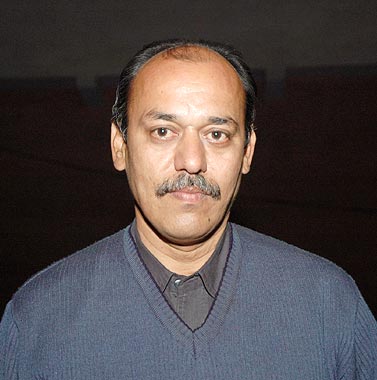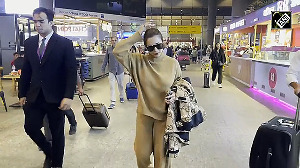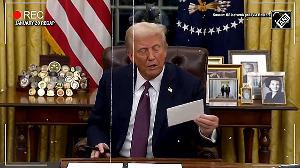 Waiting for hours to interview an Aishwarya Rai or Hrithik Roshan goes with the journalistic territory, but a seven-hour wait to speak to an advocate in Indore?
Waiting for hours to interview an Aishwarya Rai or Hrithik Roshan goes with the journalistic territory, but a seven-hour wait to speak to an advocate in Indore?
Then again, Shailendra Dwivedi is no ordinary advocate -- he hit the headlines the other day, when he filed a case against Aishwarya Rai and Hrithik Roshan for their on-screen kiss in Dhoom 2.
On January 4, an Indore court will decide if the lip-lock in the film is Dhoom 2 is objectionable, as Dwivedi argues in his petition; it will also decide what if any action can, and should be, taken under the provisions of the Indian legal system.
Ever since the case was filed, Dwivedi has been much in demand -- to the point where he now carefully screens his calls. He will not take calls if the number is not known to him; he does not respond to SMS messages; he is just this shade short of being totally incommunicado.
"I am tired of taking phone calls," the lawyer told rediff.com in an exclusive conversation outside the Indore city court. "I don't want to talk to any mediapersons. They think this is all a gimmick, and that I am here to be in the limelight. This is not true, and you will know all this by Monday (The court date has since been extended from Monday December 11 to Thursday, January 4).
"My conscience made me file this case," says Dwivedi, a tall man with a receding hairline.
The city court is a hive of activity. Hundreds of lawyers bustle around in the shed just outside the court; within, the court precincts hum with frenetic activity. Villagers come long distances to fight various land cases squat in the corridors; bystanders gape as undertrials in chains shuffle down the corridors, escorted by policemen.
Women and young children come to meet their incarcerated fathers, whose cases are up for hearing.
In this mass of humanity, Dwivedi has carved a place for himself. In a corner of the court premises is the prominently displayed sign 'Advocate Shailendra Dwivedi', in Hindi, along with his mobile and landline phone numbers. That board, those prominent numbers, speak to a time when his life was lived outside of the limelight that now seeks him out.
Dwivedi appears at his table for a few minutes, then vanishes into the teeming crowds. When I get to where he is, the advocate reluctantly agrees to speak, but says he will not answer all questions. He is, he says, fed up with calls from journalists, and does not want all this publicity.
He is clear in his mind, though, that the Aishwarya-Hrithik lip-lock in the film is a clear case of obscenity.
Dhoom 2, he says in his petition, lowered the dignity of Indian women and gave an obscene message to India's youth.
"They are portraying vulgarity in our Indian culture," says Dwivedi. "Dhoom 2 cannot be watched by Indian families because it is a vulgar film."
What precisely is objectionable, I ask. Pressed on the point, the advocate says "I felt the kissing scene was objectionable. I went to see the film with my child and it was quite embarrassing. The least they could have done was certify this as an adult film. No one is bothered about this, not even the censors. This is not right according to our Indian culture."
So how does he define Indian culture, where and how does he draw the line? "I don't want to get into that controversy," he says, side-stepping the question.
In a sense, his reluctance to speak to the media is understandable -- newspapers in Indore have been publishing stories accusing the advocate of seeking publicity. He is, Dwivedi says, fed up of all the unwanted attention, and now prefers to keep the media at a distance.
This incidentally is not his first tilt at tinseltown. He had earlier filed a case against Dharmendra and Hema Malini, when Dharmendra said he had not converted to Islam and married Hema Malini as his second wife.
He also filed a case against director J P Dutta's LoC Kargil after the Indian flag was shown wrongly draped and placed on the coffins of Indian martyred soldiers.
The most high profile of his cases was the one he filed against painter M F Husain, when he drew Hindu goddesses in the nude.
"Husain had no business to paint Mother India and other goddesses naked. It was very insulting for every Indian," Dwivedi says, his anger evident in his tone.
But what, then, of artistic license, of the freedom of expression that is the bedrock of a democracy?
"Why don't you paint your own mother nude?" Dwivedi demands. "When you can show Durga and other goddess naked, then why not Husain's mother's naked portrait too? Let him do that first. I think it is an insult to our nation to do such acts."
Born into a family of lawyers, Dwivedi believes the Constitution is his only religion, and argues that no one has the right to hurt the sentiments of the Indian people.
But why Aishwarya? After all, Mallika Sherawat became famous for 17 kissing scenes in a single film? "I never see Hindi films," Dwivedi says. "I didn't see any of Mallika Sherawat's films, therefore I am not aware of these things. I happened to see Dhoom 2 and I found the scene objectionable. It is a film that one cannot see with one's family, and therefore I filed a case. Whenever I feel something is wrong, then I do these things on an individual basis."
Then again, not a single case he has filed thus far on such issues has met with success -- so what then is the point? "I hope to get justice one day," he says, simply.
"I am not disappointed; I only want that such acts should not be repeated. other filmmakers must learn from past experiences, by not including such obscene scenes in the future. If that happens, then that is my victory."
--Syed Firdaus Ashraf in Indore






 © 2025
© 2025